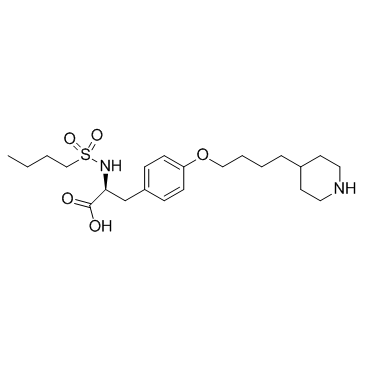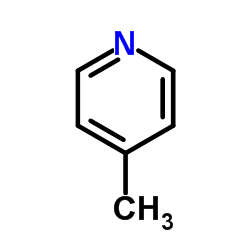144494-65-5
| Name | tirofiban |
|---|---|
| Synonyms |
Tirofiban [BAN:INN]
N-(Butylsulfonyl)-O-[4-(piperidin-4-yl)butyl]-L-tyrosine N-(n-butanesulfonyl)-O-(4-(4-piperidinyl)butyl)-(S)-tyrosine MFCD05237246 2-S-(n-Butylsulfonylamino)-3[4-(piperidin-4-yl)butyloxyphenyl]propionic acid (S)-2-(butane-1-sulfonylamino)-3-[4-(4-piperidin-4-yl-butoxy)phenyl]-propionic acid Agrastat Agrastat (TN) N-(Butylsulfonyl)-O-[4-(4-piperidinyl)butyl]tyrosine (2S)-2-(butylsulfonylamino)-3-[4-(4-piperidin-4-ylbutoxy)phenyl]propanoic acid UNII-GGX234SI5H Aggrastat Tirofiban Tirofiban (INN) (2S)-2-(butane-1-sulfonamido)-3-{4-[4-(piperidin-4-yl)butoxy]phenyl}propanoic acid N-(BUTYLSULFONYL)-O-[4-(4-PIPERIDINYL)BUTYL]-L-TYROSINE L700462 MK383 |
| Description | Tirofiban(L700462;MK383) is a potent non-peptide, glycoprotein IIb/IIIa (integrins alphaIIbbetaIII) antagonistTarget: integrin IIb/IIIa Tirofiban hydrochloride monohydrate blocks platelet aggregation and thrombus formation. Tirofiban is an antithrombotic used in the treatment of unstable angina.Tirofiban, in a concentration-dependent manner reduced platelet aggregation evoked by ADP (IC50 approximately 70 ng/ml), collagen (IC50 approximately 200 ng/ml), and thrombin (IC50 approximately 5,000 ng/ml). |
|---|---|
| Related Catalog | |
| References |
[4]. Valgimigli M, Tebaldi M. Safety evaluation of tirofiban. Expert Opin Drug Saf. 2010 Sep;9(5):801-19. |
| Density | 1.2±0.1 g/cm3 |
|---|---|
| Boiling Point | 611.7±65.0 °C at 760 mmHg |
| Melting Point | 223-225ºC |
| Molecular Formula | C22H36N2O5S |
| Molecular Weight | 440.597 |
| Flash Point | 323.7±34.3 °C |
| Exact Mass | 440.234497 |
| PSA | 113.11000 |
| LogP | 4.14 |
| Vapour Pressure | 0.0±1.8 mmHg at 25°C |
| Index of Refraction | 1.532 |
| Storage condition | -20°C |
| Hazard Codes | Xi |
|---|---|
| Risk Phrases | 36/37/38 |
| Safety Phrases | S22-S26-S30-S36/37/39-S45 |
| RIDADR | UN3261 |
| Packaging Group | II |
| Hazard Class | 8 |
| HS Code | 2942000000 |
|
~99% 
144494-65-5 |
| Literature: Chung; Zhao; Hughes; Grabowski Tetrahedron, 1993 , vol. 49, # 26 p. 5767 - 5776 |
|
~% 
144494-65-5 |
| Literature: Tetrahedron, , vol. 49, # 26 p. 5767 - 5776 |
| Precursor 2 | |
|---|---|
| DownStream 0 | |
| HS Code | 2942000000 |
|---|

